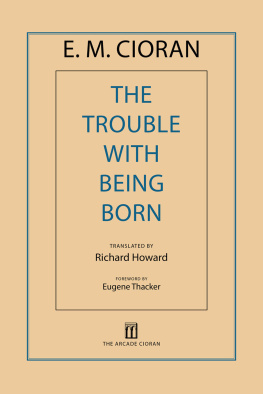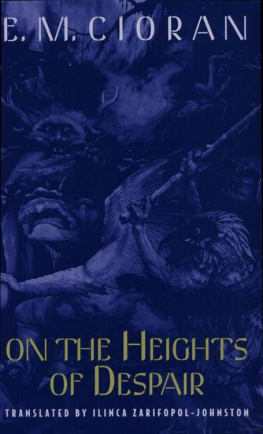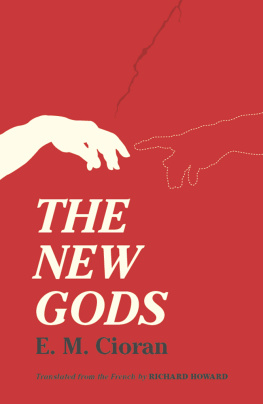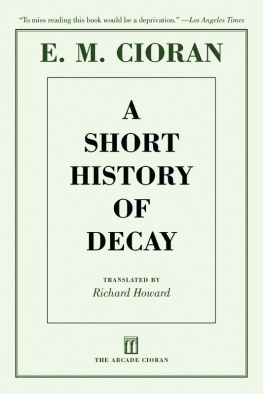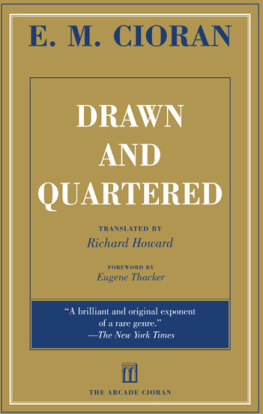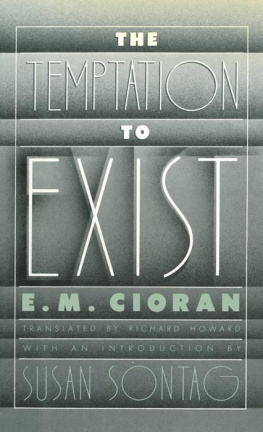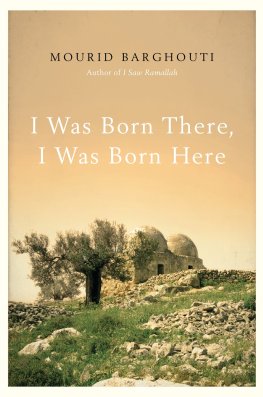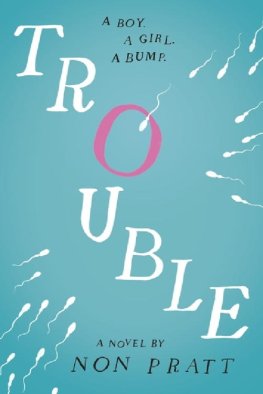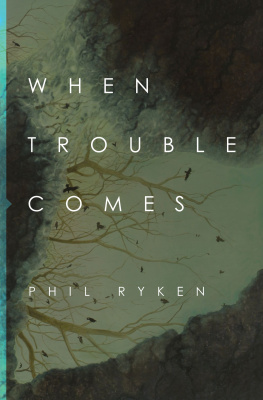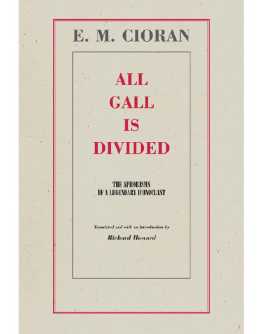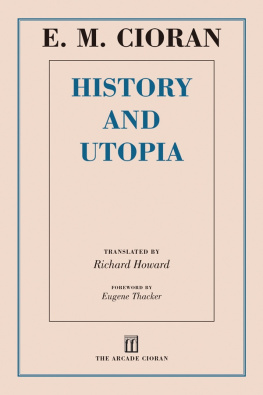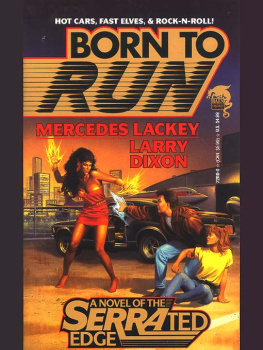E. M. Cioran - The Trouble with Being Born
Here you can read online E. M. Cioran - The Trouble with Being Born full text of the book (entire story) in english for free. Download pdf and epub, get meaning, cover and reviews about this ebook. year: 2020, publisher: Arcade, genre: Detective and thriller. Description of the work, (preface) as well as reviews are available. Best literature library LitArk.com created for fans of good reading and offers a wide selection of genres:
Romance novel
Science fiction
Adventure
Detective
Science
History
Home and family
Prose
Art
Politics
Computer
Non-fiction
Religion
Business
Children
Humor
Choose a favorite category and find really read worthwhile books. Enjoy immersion in the world of imagination, feel the emotions of the characters or learn something new for yourself, make an fascinating discovery.
- Book:The Trouble with Being Born
- Author:
- Publisher:Arcade
- Genre:
- Year:2020
- Rating:3 / 5
- Favourites:Add to favourites
- Your mark:
- 60
- 1
- 2
- 3
- 4
- 5
The Trouble with Being Born: summary, description and annotation
We offer to read an annotation, description, summary or preface (depends on what the author of the book "The Trouble with Being Born" wrote himself). If you haven't found the necessary information about the book — write in the comments, we will try to find it.
The Trouble with Being Born — read online for free the complete book (whole text) full work
Below is the text of the book, divided by pages. System saving the place of the last page read, allows you to conveniently read the book "The Trouble with Being Born" online for free, without having to search again every time where you left off. Put a bookmark, and you can go to the page where you finished reading at any time.
Font size:
Interval:
Bookmark:

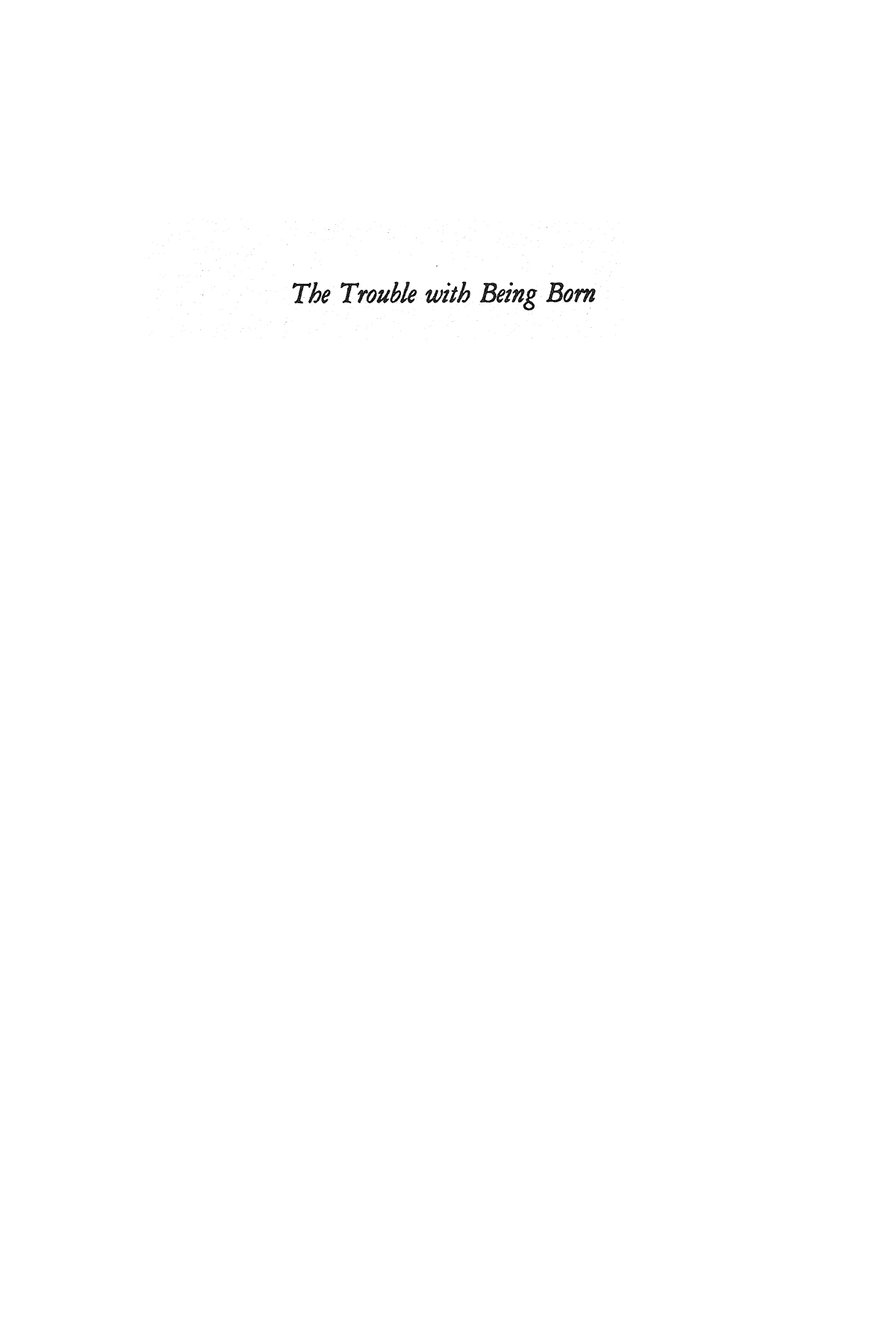
BY E. M. CIORAN
Anathemas and Admirations
Drawn and Quartered
History and Utopia
On the Heights of Despair
A Short History of Decay
Tears and Saints
The Temptation to Exist
The Trouble with Being Born

Copyright 1973 by Editions Gallimard
English-language translation copyright 1976, 2012 by Seaver Books
Foreword copyright 2012 by Skyhorse Publishing, Inc.
All Rights Reserved. No part of this book may be reproduced in any manner without the express written consent of the publisher, except in the case of brief excerpts in critical reviews or articles. All inquiries should be addressed to Arcade Publishing, 307 West 36th Street, 11th Floor, New York, NY 10018.
First published in France under the title De linconvnient dtre n
Arcade Publishing books may be purchased in bulk at special discounts for sales promotion, corporate gifts, fund-raising, or educational purposes. Special editions can also be created to specifications. For details, contact the Special Sales Department, Arcade Publishing, 307 West 36th Street, 11th Floor, New York, NY 10018 or .
Arcade Publishing is a registered trademark of Skyhorse Publishing, Inc., a Delaware corporation.
Visit our website at www.arcadepub.com.
10 9 8 7 6 5 4 3 2
Library of Congress Cataloging-in-Publication Data is available on file.
ISBN: 978-1-61145-740-7
Printed in the United States of America
by Eugene Thacker
In June of 1969, the French newspaper Le Monde published a two-page spread entitled Cioran, or the Contemplative Nihilist. The title was ambiguous; it was difficult to tell if it was meant as an accolade or an accusation. While Ciorans work had been steadily gaining in reputation, many critics and readers were put off by the sullen, morose tone of his books as well as by the difficult-to-categorize style of his writing. To be judged a contemplative nihilist is at best a kind of back-handed compliment. The Le Monde article may as well have called Cioran a euphoric pessimist, an equally apt description. It was as if to say, Yes, you may be a nihilist or a pessimist, but only in thoughta nihilist at a distance, a pessimist at arms length.
When Cioran published De linconvnient dtre n (translated here as The Trouble with Being Born) in 1973, it marked the midpoint of a trajectory that had taken him from a small village in Romania to cosmopolitan Bucharest and then Paris, where he was to remain for the rest of his life. It was a time of loss and refusals for Cioran. A few years before, Ciorans mother and sister had died. A year after the article in Le Monde, Ciorans close friend, the playwright Arthur Adamov, committed suicide; less than a year later his colleague, the poet Paul Celan, who had translated Ciorans work into German, also committed suicide; and the year that The Trouble with Being Born was published saw the death of another close friend, the existentialist philosopher Gabriel Marcel. It was also a period of refusals. Cioran proudly spurned several gestures of monetary support, as well as numerous literary prizes, many of them financially significant. All the while Cioran continued to live modestly in his rented apartment on the Rue de lOdon, working at his compact and cluttered writing desk, taking his frequent walks in the neighborhood.
In his books, Cioran is always scaling up and zooming out, always posing the question at an even more fundamental level, and it is this approach that characterizes The Trouble with Being Born. Here we see Cioran grappling with an age-old philosophical dilemmathe problem with being here, in this moment, thrown into an existence that one has neither asked for nor desired, in a world that we have difficulty wholeheartedly accepting or rejecting. Today, in the early years of the new millennium, academics discuss the problems of global climate change, sustainability, and overpopulation, taking sides in philosophical debates on natalism and antinatalism. Such debates are not new. In the 1970s, journalists and public thinkers frequently discussed the population bomb and the end of history. But in The Trouble with Being Born Cioran remains skeptical of such a myopic emphasis on the presenthis writing asks whether such issues are not simply an indicator of a fraught relationship to our own mortalitythe latest stage in Western cultures fall into time. It is hard not to see The Trouble with Being Born as an extended meditation on the problem of time and temporality that begins with Ciorans own devastating realization late one night, in the slow seconds of his lifelong struggle with insomnia: Three in the morning. I realize this second, then this one, then the next: I draw up a balance sheet for each minute. And why all this? Because I was born. It is a special type of sleeplessness that produces the indictment of birth.
The content of The Trouble with Being Born is inseparable from its form. This is a hallmark of every one of Ciorans books, but The Trouble with Being Born is unique in Ciorans oeuvre in that it is rigorously composed entirely of brief and concise aphorisms. It is here that Ciorans influences are the most apparent, particularly that of the tradition of the philosophical aphorismChamfort, La Rochefoucauld, Leopardi, Novalis, Nietzsche. In its style, it looks back to Ciorans books such as All Gall Is Divided and forward to Drawn and Quartered. But The Trouble with Being Born is the most uncompromising of the lot, at once an extended meditation on the problems of temporal contingency and yet an unfinished scattering of chance thoughts and anxious epiphanies. Each of the aphorisms touches the reader with a certain immaterial weight, like a slow clock ticking off one second after the other. Even the French title, De linconvnient dtre n, betrays this profound hesitancyliterally, On the inconvenience of having been borna phrase at once sardonic and tragic, a combination emblematic of Ciorans twilight thought.
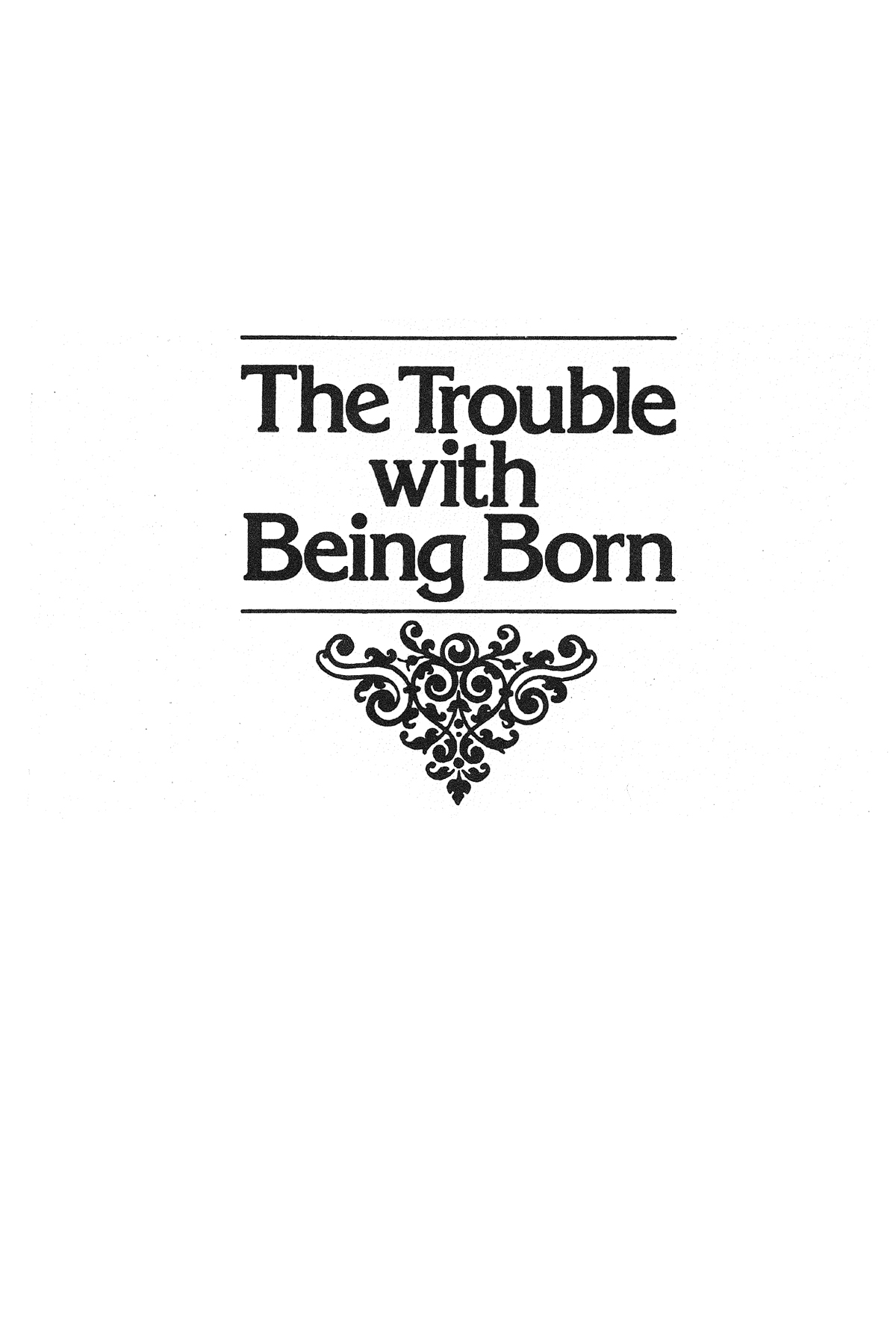

Three in the morning. I realize this second, then this one, then the next: I draw up the balance sheet for each minute. And why all this? Because I was born. It is a special type of sleeplessness that produces the indictment of birth.
Ever since I was bornthat since has a resonance so dreadful to my ears it becomes unendurable.
There is a kind of knowledge that strips whatever you do of weight and scope: for such knowledge, everything is without basis except itself. Pure to the point of abhorring even the notion of an object, it translates that extreme science according to which doing or not doing something comes down to the same thing and is accompanied by an equally extreme satisfaction: that of being able to rehearse, each time, the discovery that any gesture performed is not worth defending, that nothing is enhanced by the merest vestige of substance, that reality falls within the province of lunacy. Such knowledge deserves to be called posthumous: it functions as if the knower were alive and not alive, a being and the memory of a being. Its already in the past, he says about all he achieves, even as he achieves it, thereby forever destitute of the
Next pageFont size:
Interval:
Bookmark:
Similar books «The Trouble with Being Born»
Look at similar books to The Trouble with Being Born. We have selected literature similar in name and meaning in the hope of providing readers with more options to find new, interesting, not yet read works.
Discussion, reviews of the book The Trouble with Being Born and just readers' own opinions. Leave your comments, write what you think about the work, its meaning or the main characters. Specify what exactly you liked and what you didn't like, and why you think so.

